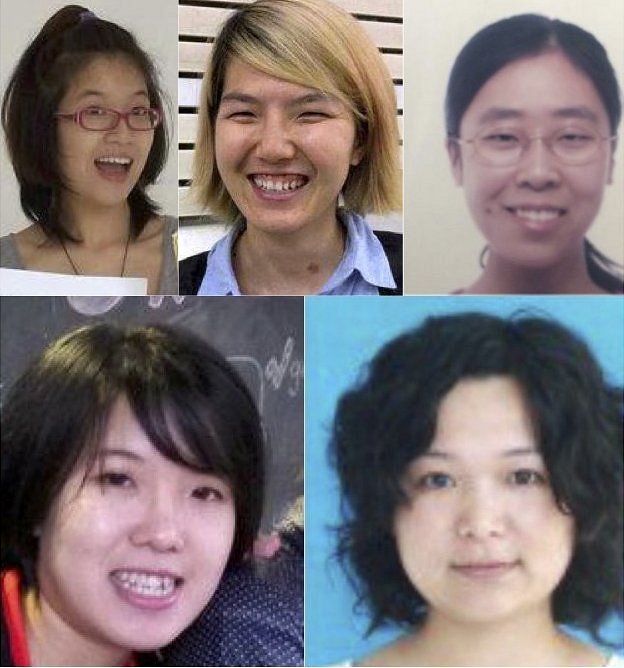China's detained 'guerrilla feminists'
- Published

They are a group of feminists who are dedicated to campaigning against sexual abuse and domestic violence.
They frequently carried out guerrilla-style protests to raise awareness about their cause.
For one protest they wore wedding dresses splattered in red paint to symbolise the plight of abused women.
In another they called on the government to provide more female public toilets.
They thought they knew how to avoid problems with the authorities.
To mark International Women's Day on 8 March they planned to hand out leaflets and put stickers on public buses and subways to raise awareness about sexual harassment.
But before the protest even took place about 10 activists were rounded up by the police.
Almost a month later, five of the women - Li Tingting, Wang Man, Wei Tingting, Wu Rongrong and Zheng Churan - remain in custody.
They face public disorder charges - a catch-all law that is often used by the authorities to silence dissidents.
Now there is growing concern for the health of two of the women - Wang Man and Wu Rongrong.
They both suffer from serious illnesses - a heart condition and chronic liver disease - and have been moved to a hospital detention centre. Their lawyers say their conditions have worsened during their time in detention.
At a Beijing cafe, I met one of the activists who was detained before the planned protest but later released. She asked us not to reveal her identity, fearing government reprisals.
"I was very scared when I was first detained but now I feel I did something meaningful," she told me.
"But I'm very worried about what will happen to the others. If they're sentenced to time in jail it will be a heavy blow to our movement."
When I asked her if she would protest again, she replied: "At the moment I wouldn't do anything as extreme as protesting on the streets. We may have to change our strategy. But the movement will continue."
Despite growing international criticism, China is refusing to release the activists.
Speaking last week, Hua Chunying, a spokeswoman for China's foreign ministry, said: "No one has the right to ask China to release relevant persons, so we hope that relevant people will stop interfering in China's judicial sovereignty in such a manner."
But this case is part of what has been described by human rights groups as China's harshest crackdown in recent memory.
'Terrifying time'
Since coming to power two years ago, President Xi Jinping's government has locked up journalists, lawyers, NGO workers and activists of all stripes.
He has warned against what he sees as western ideas infiltrating China and threatening the ruling Communist Party's grip on power.
One of the lawyers for the women, Liang Xiaojun, says now is a terrifying time for civil society.
"Lawyers and human rights activists are living in terror," he said. "We don't know when we'll be arrested."
"Even a women's rights group which poses no threat to the political regime is being targeted. It just shows how the police are abusing their powers."
According to Chinese law, the women need to either be released or formally charged by the middle of this month.
The police may let them go with a warning ringing in their ears that they will not be so lucky next time.
But if they are charged with disturbing the social order they face up to five years in prison.
Whatever the outcome, this case has sent a chill through activists in China.
- Published25 March 2015
- Published9 March 2015